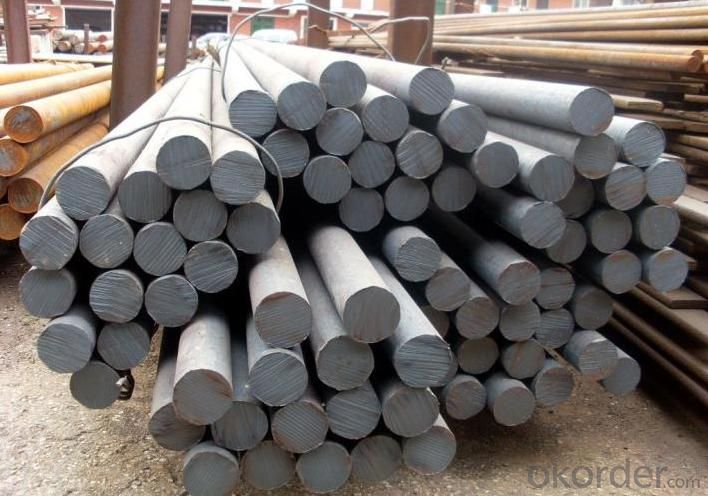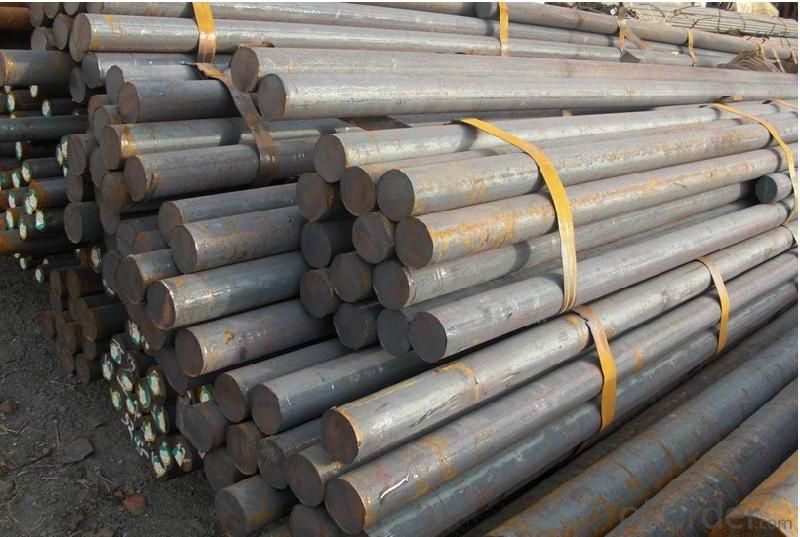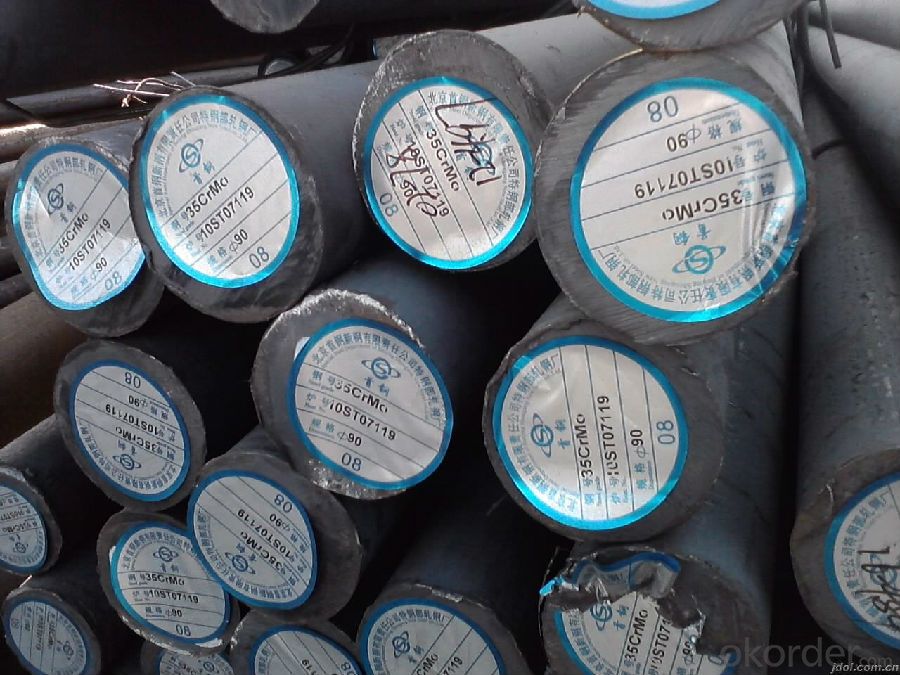Q235 Steel Round Bar From CNBM 16mm-300mm
- Loading Port:
- China main port
- Payment Terms:
- TT OR LC
- Min Order Qty:
- 25 m.t.
- Supply Capability:
- 50000 m.t./month
OKorder Service Pledge
OKorder Financial Service
You Might Also Like
Item specifice
Q235 Steel Round Bar From CNBM 16mm-300mm
Product Description:
1. Sizes: Diameter: 6mm-150mm; Length: 6m, 9m, 12m
2. Grade: Q195, Q235
3. Invoicing on theoretical weight or actual weight as customer’s request
4. Shape: Round bar, solid bar of steel with circular section
5. Technique: Hot rolled
6. Details of specification
Diameter | Mass | Diameter | Mass | Diameter | Mass |
(mm) | (kg/m) | (mm) | (kg/m) | (mm) | (kg/m) |
6 | 0.22 | 22 | 2.98 | 53 | 17.30 |
7 | 0.30 | 24 | 3.55 | 56 | 19.30 |
8 | 0.40 | 25 | 3.85 | 60 | 22.20 |
9 | 0.50 | 26 | 4.17 | 63 | 24.50 |
10 | 0.62 | 28 | 4.83 | 65 | 26.00 |
11 | 0.75 | 30 | 5.55 | 70 | 30.20 |
12 | 0.89 | 32 | 6.31 | 75 | 34.70 |
13 | 1.04 | 34 | 7.13 | 80 | 39.50 |
14 | 1.21 | 36 | 7.99 | 85 | 44.50 |
15 | 1.39 | 38 | 8.90 | 90 | 49.90 |
16 | 1.58 | 40 | 9.86 | 95 | 55.60 |
17 | 1.78 | 42 | 10.90 | 100 | 61.70 |
18 | 2.00 | 45 | 12.50 | 120 | 88.85 |
19 | 2.23 | 48 | 14.20 | 140 | 120.93 |
20 | 2.47 | 50 | 15.40 | 150 | 138.82 |
Usage and Applications of Steel Round Rod Bar
1. Steel round bar is used in a large number of architectural and engineering structures. Or it can be used in construction of plants for the production of steel house frames, high-voltage transmission towers, bridges, vehicles, boilers, containers, ships, etc.
2. And we can use this kind of product on the performance of the mechanical parts if the demand is not very high.
3. Some especial material steel round bar can be used for main shaft of steamer, hummer shank, with big section and supper force.
Pruduct show:



- Q:What are the different high-temperature grades of special steel?
- There exists a variety of special steel grades that can withstand extreme heat and provide enhanced mechanical properties. Some of the frequently utilized high-temperature grades are as follows: 1. Stainless steel 310: Renowned for its exceptional resistance to oxidation at high temperatures, this grade boasts a high chromium and nickel content, resulting in excellent corrosion resistance and elevated temperature strength. 2. Inconel 625: Inconel alloys, which are nickel-based superalloys, exhibit remarkable resistance to oxidation and corrosion. In particular, Inconel 625 offers outstanding strength and toughness at high temperatures, rendering it suitable for applications in aerospace and chemical processing industries. 3. Hastelloy X: A notable example is Hastelloy X, a nickel-chromium-iron-molybdenum alloy that showcases extraordinary strength and oxidation resistance at elevated temperatures. It finds widespread use in gas turbine engines, industrial furnace components, and other high-temperature applications. 4. Alloy 800H: This specific grade of special steel is an austenitic alloy that possesses high resistance to oxidation, carburization, and nitridation. It frequently finds application in heat exchangers, furnace components, and petrochemical industries. 5. Titanium Grade 5: While technically not steel, titanium grade 5 is a high-temperature alloy that delivers exceptional strength and corrosion resistance at elevated temperatures. It is commonly employed in aircraft engine components, chemical processing equipment, and marine applications. These examples merely represent a fraction of the high-temperature grades of special steel available in the market. Each grade serves a specific purpose, excelling in various applications that demand extreme heat resistance and specific mechanical properties.
- Q:What are the different corrosion protection methods used for special steel?
- To ensure the durability and longevity of special steel, various methods are employed for corrosion protection. These methods encompass: 1. Coatings: The application of diverse coatings, including paint, epoxy, or zinc, creates a protective layer on the steel surface. Such coatings function as barriers, preventing direct contact between moisture, corrosive elements, and the steel. 2. Galvanization: By coating the steel with a layer of zinc through the process of galvanization, a sacrificial barrier is formed wherein the zinc corrodes instead of the steel. Galvanized steel is commonly utilized in outdoor applications such as fences, poles, and roofing. 3. Stainless steel: Special steel can be manufactured using stainless steel, which contains a high percentage of chromium. The presence of chromium results in the formation of a passive layer on the steel's surface, endowing it with excellent corrosion resistance. Stainless steel finds wide usage in industries like construction, food processing, and medical equipment. 4. Cathodic protection: This method involves the creation of an electrical current or the utilization of sacrificial anodes to protect the steel. By introducing a more reactive metal (sacrificial anode) or applying an electrical current, corrosion is minimized as the reactive metal corrodes instead of the steel. 5. Alloying: Modifying the steel's composition by incorporating elements like nickel, molybdenum, or copper can enhance its resistance to corrosion. These alloying elements form a protective layer on the surface, rendering the steel more resistant to rust and other forms of corrosion. 6. Passivation: Passivation is a chemical process that eliminates free iron from the steel's surface, leading to the formation of a protective oxide layer. This layer acts as a barrier against corrosion, augmenting the steel's resistance to rust and other forms of corrosion. 7. Proper maintenance: Regular inspection, cleaning, and maintenance of special steel play a vital role in preventing corrosion. The removal of dirt, debris, and other contaminants from the steel's surface aids in preserving its protective coatings and averting corrosion. It is crucial to select the appropriate corrosion protection method based on the specific application and environmental conditions to ensure the long-term performance and durability of special steel.
- Q:What are the main characteristics of high-speed steel forgings?
- Highly desirable in various industries are high-speed steel forgings, which possess several key characteristics. To begin, the exceptional hardness and wear resistance of high-speed steel forgings are noteworthy. This is a result of their composition, which typically includes elements like tungsten, molybdenum, chromium, and vanadium. These elements create hard carbides within the steel matrix, leading to a material capable of enduring high temperatures and resisting abrasion and deformation. Additionally, high-speed steel forgings exhibit excellent heat resistance, enabling them to maintain their hardness and strength even at elevated temperatures. This is particularly significant in applications where tools or components undergo intense heat during operation. Another important trait of high-speed steel forgings is their ability to retain a sharp cutting edge for extended periods. This proves advantageous in cutting tools, where an efficient and precise machining process relies on a sharp edge. The steel's high hardness ensures the cutting edge remains sharp, resulting in enhanced tool life and performance. Moreover, high-speed steel forgings demonstrate good toughness and impact resistance, making them less vulnerable to cracking or chipping under heavy loads or sudden impacts. This ensures their durability and reliability in demanding applications. In addition to these mechanical properties, high-speed steel forgings possess excellent machinability. They can be easily shaped, formed, and machined into intricate geometries, making them ideal for producing complex components or tools. Overall, the main characteristics of high-speed steel forgings encompass exceptional hardness, wear resistance, heat resistance, cutting edge retention, toughness, impact resistance, and machinability. These qualities render them highly sought-after in industries such as aerospace, automotive, tooling, and machining, where performance, reliability, and longevity are of utmost importance.
- Q:What are the main characteristics of magnetic steel?
- The main characteristics of magnetic steel include its ability to be magnetized and retain its magnetism, high magnetic permeability, high saturation magnetization, and low coercivity. It is commonly used in applications such as transformers, motors, and magnetic core materials.
- Q:Does special steel require special machining techniques?
- Yes, special steel often requires special machining techniques due to its unique properties and characteristics. It is typically harder, tougher, and more heat resistant compared to regular steel, making it more challenging to cut, shape, and form. Special machining techniques such as using high-speed tools, specific tool geometries, and advanced coolant systems may be necessary to achieve desired results and maintain the integrity of the special steel.
- Q:Can special steel be used in the manufacturing of sports equipment?
- Yes, special steel can be used in the manufacturing of sports equipment. Special steel refers to a type of steel that has been specifically designed and engineered to possess certain characteristics and properties that make it suitable for various specialized applications. These characteristics can include high strength, durability, resistance to corrosion and wear, and the ability to withstand extreme conditions. In the manufacturing of sports equipment, special steel can be used in a variety of ways. For example, it can be utilized to create the shafts of golf clubs or tennis rackets, where its high strength and stiffness are crucial for optimal performance. Special steel can also be used in the construction of sports equipment such as bicycles, where its lightweight yet strong properties are highly desirable. Additionally, special steel can be employed in the manufacturing of sports equipment accessories, such as hooks, buckles, or fasteners. These components often require high tensile strength and corrosion resistance, and special steel can provide these properties, ensuring the longevity and reliability of the equipment. In summary, special steel can indeed be used in the manufacturing of sports equipment, thanks to its unique properties that enhance performance, durability, and overall quality.
- Q:What are the specific requirements for special steel used in the power transmission industry?
- The specific requirements for special steel used in the power transmission industry are related to its durability, strength, and resistance to various environmental factors. These requirements are crucial as power transmission equipment operates under high loads, extreme temperatures, and corrosive conditions. Here are some specific requirements for special steel in the power transmission industry: 1. High Strength: Special steel used in power transmission must possess high strength to withstand the mechanical stresses and loads imposed by the power transmission equipment. This ensures that the steel can effectively carry the weight and resist deformation or failure. 2. Hardness: Special steel needs to have sufficient hardness to resist wear and abrasion. Power transmission equipment often involves moving parts that experience constant friction and contact, so the steel must be able to withstand these forces without wearing down quickly. 3. Corrosion Resistance: The steel used in power transmission should have excellent resistance to corrosion and rusting. Power transmission equipment is frequently exposed to moisture, chemicals, and other corrosive substances, so the steel must be able to withstand these conditions without deteriorating or losing its structural integrity. 4. Heat Resistance: Power transmission equipment operates at high temperatures, especially in cases of power generation and distribution. Therefore, special steel used in this industry must possess high heat resistance to prevent deformation, loss of strength, or failure under extreme thermal conditions. 5. Electrical Conductivity: Some power transmission components require steel with good electrical conductivity to ensure efficient transmission of electricity. Steel used for conductive purposes must have low resistance to electrical flow, allowing for minimal power loss during transmission. 6. Fatigue Resistance: Special steel used in the power transmission industry should have excellent fatigue resistance properties. This means that the steel can withstand repeated cycles of stress and strain without cracking or breaking, thereby ensuring its long-term reliability and durability. 7. Dimensional Stability: The steel used in power transmission must maintain its dimensional stability over time. This ensures that the equipment maintains its intended design and functionality, even under different operating conditions. In conclusion, the specific requirements for special steel used in the power transmission industry include high strength, hardness, corrosion resistance, heat resistance, electrical conductivity, fatigue resistance, and dimensional stability. These requirements ensure that the steel can withstand the demanding operational conditions and provide reliable and efficient power transmission.
- Q:How is special steel used in the mining industry?
- Special steel is widely used in the mining industry due to its exceptional properties such as high strength, durability, and resistance to wear and corrosion. It is utilized in various applications including the manufacturing of drilling tools, crushing equipment, conveyor systems, and structural components for mining machinery. Additionally, special steel is used in the production of wear-resistant plates and liners, which protect mining equipment from abrasion and extend their lifespan. This type of steel plays a crucial role in enhancing the efficiency and safety of mining operations.
- Q:How is special steel used in the manufacturing of bearings?
- Due to its unique properties, special steel is utilized in the production of bearings, which are vital components employed in various industries. These bearings serve the purpose of reducing friction between moving parts, promoting smooth motion, and supporting heavy loads. The utilization of special steel guarantees exceptional performance and longevity. For the production of bearings, the preferred choice of special steel includes stainless steel and high-carbon chromium steel. This selection is based on the remarkable strength, hardness, and resistance to corrosion that these types of steel possess. These properties enable the bearings to endure heavy loads, withstand wear and tear, and operate effectively in challenging environments. The manufacturing process for bearings involves shaping and heat treatment. Initially, special steel is melted and cast into the desired form, typically a ring or a ball. Subsequently, the steel undergoes various heat treatment procedures like annealing, quenching, and tempering to enhance its hardness, toughness, and overall mechanical properties. This heat treatment ensures that the steel is adequately hardened to endure the stress and friction it will encounter during operation. Once the steel has undergone appropriate heat treatment, it is machined and ground to attain precise dimensions and smooth surfaces. This step is vital to ensure that the bearings possess the necessary tolerance and can rotate smoothly without any interference. Special steel's machinability and grindability simplify the achievement of the required accuracy and surface finish. Following the machining process, the bearings can be assembled with other components and lubricated to ensure proper lubrication and minimize friction. Special steel's corrosion resistance is particularly valuable at this stage as it shields the bearings from rust and degradation caused by moisture or aggressive environments. In conclusion, special steel is chosen for the production of bearings due to its exceptional strength, hardness, and corrosion resistance. These properties enable the bearings to withstand heavy loads, resist wear, and function effectively in challenging conditions. With the aid of its excellent machinability and grindability, special steel guarantees the attainment of the necessary precision and surface finish. Overall, special steel plays a pivotal role in the production of high-quality bearings that enable efficient and reliable motion in various industries.
- Q:What is the role of special steel in the construction industry?
- Special steel plays a crucial role in the construction industry as it provides strength, durability, and resistance to various environmental factors. It is commonly used in the construction of high-rise buildings, bridges, and infrastructure projects. Special steel's unique properties, such as high tensile strength, corrosion resistance, and heat resistance, make it suitable for critical applications where standard steel may not suffice. It ensures the structural integrity and safety of construction projects, making it an essential material in the industry.
1. Manufacturer Overview |
|
|---|---|
| Location | |
| Year Established | |
| Annual Output Value | |
| Main Markets | |
| Company Certifications | |
2. Manufacturer Certificates |
|
|---|---|
| a) Certification Name | |
| Range | |
| Reference | |
| Validity Period | |
3. Manufacturer Capability |
|
|---|---|
| a)Trade Capacity | |
| Nearest Port | |
| Export Percentage | |
| No.of Employees in Trade Department | |
| Language Spoken: | |
| b)Factory Information | |
| Factory Size: | |
| No. of Production Lines | |
| Contract Manufacturing | |
| Product Price Range | |
Send your message to us
Q235 Steel Round Bar From CNBM 16mm-300mm
- Loading Port:
- China main port
- Payment Terms:
- TT OR LC
- Min Order Qty:
- 25 m.t.
- Supply Capability:
- 50000 m.t./month
OKorder Service Pledge
OKorder Financial Service
Similar products
New products
Hot products
Related keywords





























